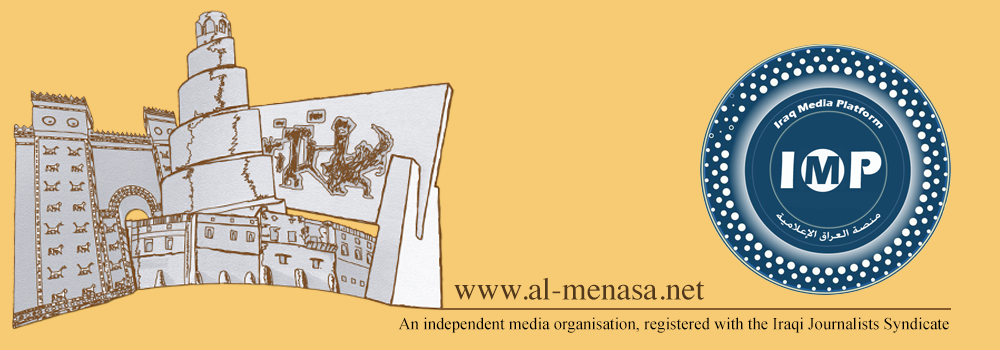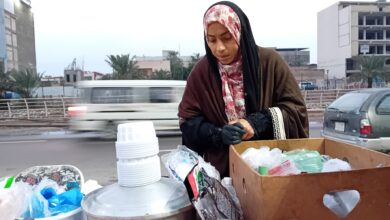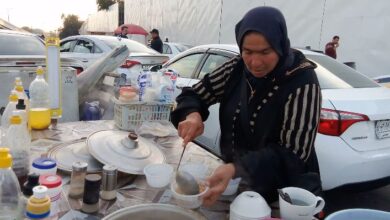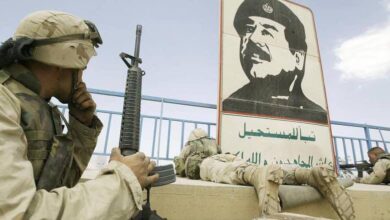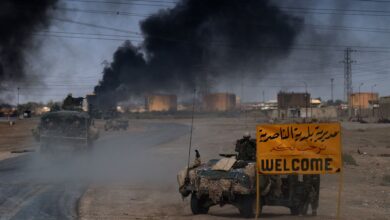THE OPPOSITION IN NASIRIYAH: How anti-government demonstrators succeeded in Iraq’s federal elections

In a café in Habboubi Square in the center of Nasiriyah city, Hisham al-Khafaji sits with his companions, all their eyes directed towards the TV screen on the wall. They are watching and waiting for the final decision on the results of Iraq’s October elections. Politicians who lost have asked electoral authorities and Iraq’s highest courts to repeal the results, claiming electoral fraud.
By Muntadhar al-Khirasan in Nasiriyah
They say the election results have been skewed thanks to what is known as the Tishreen movement – these are the Iraqi anti-government protesters who have been calling for political reform since late 2019.
In Nasiriyah, a city in the center of Dhi Qar province with a population of more than 2 million people, there were 137 candidates competing in the federal elections. They were trying to gain one of the 19 seats in available parliament to representatives from the province.
At the same time, locals in Nasiriyah have played a leading role in the Tishreen protesters. The demonstrations here are seen as one of the main reasons for the resignation of the Iraqi government in late 2019.
Since protests began in October 2019, more than 130 of the demonstrators taking part have been killed and thousands more wounded. Some of the demonstrators have simply disappeared. It is suspected they were abducted but nobody knows for sure where they are.
This is why Al-Khafaji and his companions in the café are pleased with the decline in popularity and control of the traditionally powerful parties.
He is part of the Tishreen movement in his city and he says that he and his fellow protesters have already suffered much because of taking part in demonstrations. Armed men have targeted them while they were protesting in Habboubi square, detonating explosives and firing guns.
“We have suffered so much because of these people. Now it’s time for them to suffer,” al-Khafaji retorts.
Young people in Nasiriyah who could vote tried to change the status quo during federal elections in October 2021. There was an “attempt to punish the influential political blocs in power that have dominated the Iraqi scene for 18 years, by voting for independent candidates,” al-Khafaji confirmed.
This meant that the protesters were able to “to hammer the first nail in the coffin of the ruling political class,” he says, noting that it has changed the balance of power in the provinces.
In Dhi Qar province, the party formed by Tishreen protesters won five seats and another seat also went to an independent candidate. The remaining seats went to more established parties.
Most importantly for the Tishreen candidates, the Fateh movement didn’t get a single vote in the province. This is the political grouping behind which the country’s Muslim paramilitaries, known as the Popular Mobilization Units, or PMU, stand. PMU members are suspected of attacking the demonstrators in Habboubi square.
When the PMU was first formed by volunteers who agreed to fight the extremist fighters state group, many of the were seen as heroes who had offered their lives for their communities. However since the defeat of the IS group in Iraq, the PMU members have gained a bad reputation for criminal behavior as well as loyalty to neighbor Iran, rather than their own country, Iraq.
In the 2018 elections in Dhi Qar, the Fateh movement won five seats. In the most recent ballot, they lost all of these.
Part of this was due to the change in electoral laws this election, al-Khafaji conceded. But, he noted, their Tishreen-allied bloc also only had 60,000 votes less than the winning party in Dhi Qar.
Tishreen candidate and a well-known protest organizer, Alaa al-Rikabi, alone won 34,870 votes. The next most successful Tishreen candidate only won 6,805 votes and al-Khafaji says that if their supporters had voted more tactically, they could have had another three candidates in parliament.
“The Tishreen youth wanted to teach the political parties in the country a lesson through punitive voting,” explains Najm al-Ghazi, a professor of political science at Dhi Qar University. He thinks that the many hardships the protesters had to deal with have motivated them.
Al-Ghazi and other analysts in Dhi Qar suggest that locals have had enough of those in power. They have been tried several times and found wanting, is the popular consensus.
“The Tishreen movement’s success has shocked the politicians,” says al-Khafaji happily, with one eye still on the television in the cafe. “There are as many as 45 independents in Parliament now and we, the demonstrators, are waiting for them to form an opposition and to fight for our rights.”
